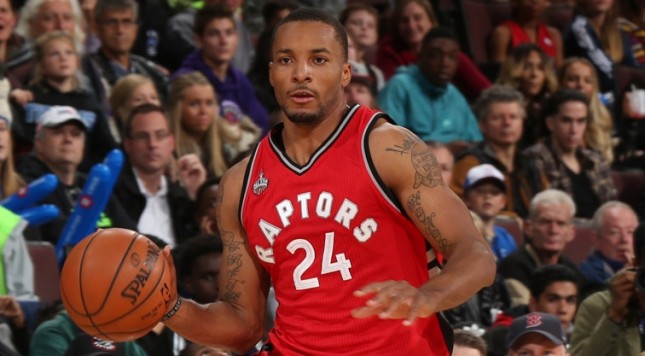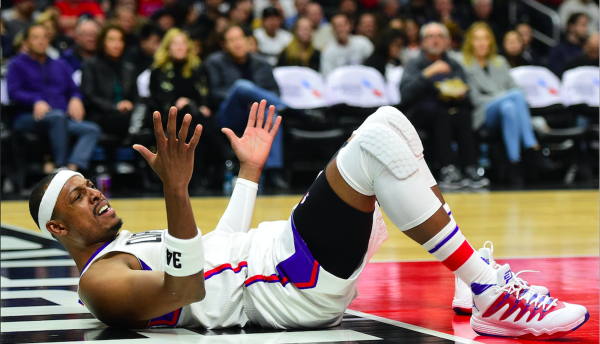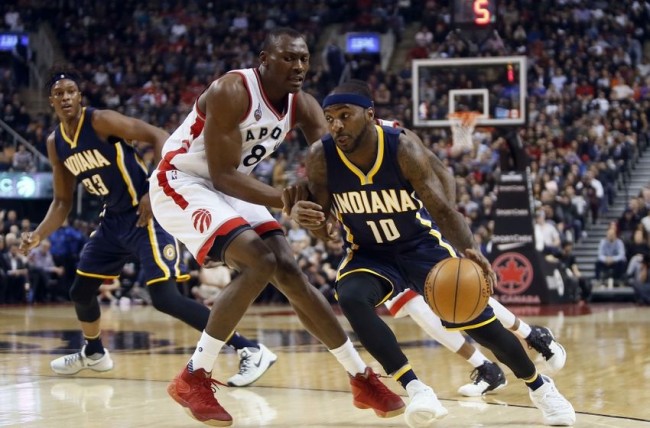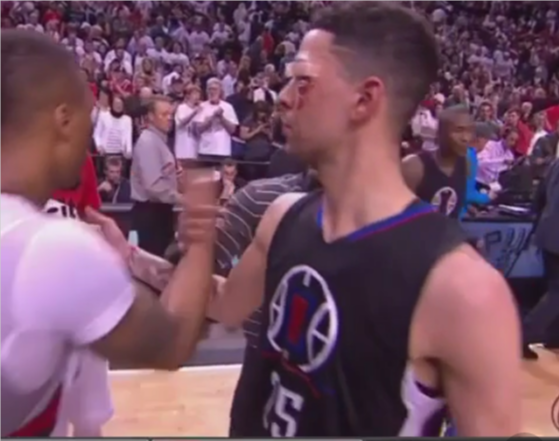The play’s the thing, as Shakespeare taught us, and without players, we don’t have much of a drama — not in the NBA playoffs or in any other competition under the sun.
The first round of the postseason presented, on many levels, the kind of portraits we expected to see. Paul George and — more poignantly — Dirk Nowitzki battled valiantly, but without much help from their teammates. In a playoff season which consumes a total of 15 series over the course of two full months, Dirk exited the stage after only five games and 10 days, but the magnificence he displayed for the Dallas Mavericks against the Oklahoma City Thunder left an enduring reminder of his greatness — as a basketball craftsman, yes, but also as one of the most admirable sportsmen of our time.
The grace and generosity Dirk extends to fans, teammates and opponents even in moments of defeat is something for all athletes to emulate. No throwing under the bus. No surly retreats into the offseason. All class, all the time, is Dirk’s standard, and that’s well worth remembering from round one of the playoffs.
Other stars did what we expect them to do. Kawhi Leonard against the Memphis Grizzlies; Draymond Green against the Houston Rockets, shrugging off his terrible Game 3 performance; Russell Westbrook against the Mavs; LeBron James and Kyrie Irving against the Detroit Pistons; Paul Millsap against the undermanned Boston Celtics — these and other first-round victors lived up to their reputations and, in some cases, exceeded them.
Yet, stars playing like stars in the first round — not something to be dismissed or ignored — doesn’t carry the same weight it will acquire in later rounds. Westbrook and Millsap, for instance, faced inferior opponents depleted by injuries in round one. If they can excel in round two, it would rate as a much bigger feat, especially if their teams can pull off memorable upsets.
A first-round review of various NBA players is best spent focusing on the supporting-cast players, the glue guys who either provided the adhesive qualities their teams needed, or showed that their usefulness in the NBA is at an end (or perhaps, in need of giving way to a different style of play).
Let’s start with the sad stories and then close on happier notes.
The greatest NBA career to end in the first round — not officially, but in the larger sense of outliving its value — belongs to Paul Pierce.
The future Hall of Famer might choose to play one more season, but The Truth of the matter for the Los Angeles Clippers is that Pierce ought to call it a career.
Just one year ago in the playoffs, Pierce was hitting game-winners and go-ahead shots for the Washington Wizards in the second round against the Atlanta Hawks. He tormented the Toronto Raptors in the first round. He was a relevant, dangerous, important player.
With the Clippers — throughout the season but especially against the Portland Trail Blazers — Pierce ceased to be that kind of complementary cog. The Clippers — sans Chris Paul and Blake Griffin — could have used exactly what Pierce gave the Wizards a year ago: clutch shotmaking and an anchoring presence in moments of crisis. He gave the Clippers and Doc Rivers absolutely nothing against Portland. The tank is empty. The Truth needs to set himself free from a playing career, and consider the next chapter in his life.
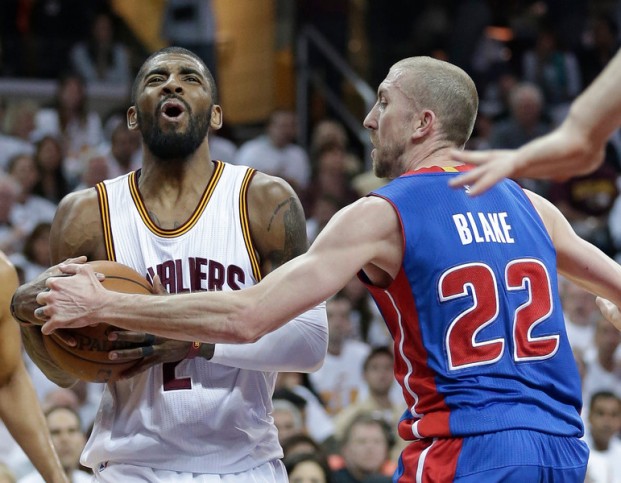
Cleveland Cavaliers’ Kyrie Irving (2) drives past Detroit Pistons’ Steve Blake (22) in the first half in Game 1 of a first-round NBA basketball playoff series, Sunday, April 17, 2016, in Cleveland. (AP Photo/Tony Dejak)
Steve Blake won’t make the Hall of Fame, but he survived in the league for over a decade, which is no small feat. However, after blundering his way through far too many possessions in the first round against the Cleveland Cavaliers, Blake’s value to the Detroit Pistons — or any NBA team, for that matter — has run out. The drop-off from Reggie Jackson to Blake was so pronounced in the first round that Detroit has to find a newer, better answer at the backup point guard position.
Perhaps Blake could become an on-roster mentor to a young point guard in another NBA city, but at this stage of his career, just how many minutes could the national champion at the University of Maryland offer to any organization in the league?
Most careers don’t last as long as Steve Blake’s very successful run. However, the end of the line seems to have finally arrived for a man who has done extremely well with the gifts he’s been given.
Another player whose first round turned into a disaster was Ty Lawson of the Indiana Pacers. Rodney Stuckey was not much of an improvement relative to Lawson — another story altogether for a Pacer team whose bench was a trainwreck against Toronto — but Lawson is the more conspicuous failure.
Daryl Morey took a chance on him, thinking he could revive Lawson’s career. The Pacers hoped Lawson could be the answer at the backup point guard spot, similarly seduced by the awareness of what Lawson brought to the Denver Nuggets. However, the memory of what Lawson once was has no relationship to the reality of what Lawson currently is. His career in tatters because of his own poor decisions and a lack of professionalism off the court, Lawson is a shell of his former self. It’s terrible to see, but one can’t deny the fact that Lawson’s career exists at the bottom of the ocean.
Enough of the sad tales of first-round players. Let’s go to the sunny side of the street.
*
Norman Powell has been a revelation for the Toronto Raptors all season long, but in the first round against the Pacers, he stood out in one specific respect: Precisely because he wasn’t on the Toronto teams which bowed out of the first round in 2014 and 2015, he — with teammate Cory Joseph (who also played well in the series, by the way) — wasn’t scared of losing. There was less fear in Powell’s game than any other (non-Joseph) player on the Toronto roster. Perhaps Powell was a beneficiary of circumstance in that he didn’t suffer through the sweep at the hands of the Washington Wizards last year. Nevertheless, he defended and generally attacked the Pacers with the relentlessness of a player who was hungry to win, as opposed to someone who was afraid to lose.
Most rookies don’t do that in their first playoff series.
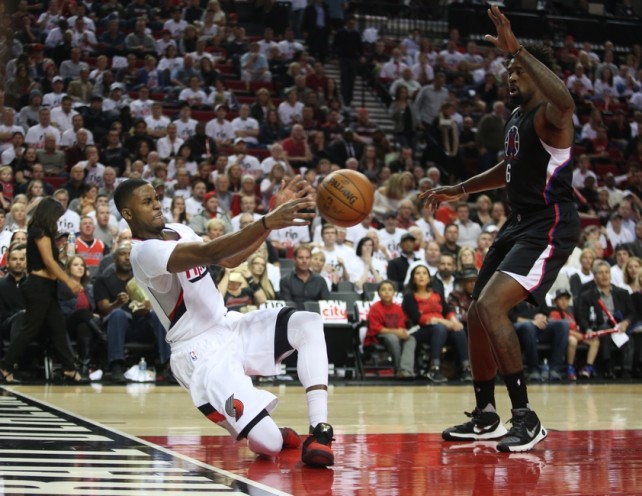
Apr 25, 2016; Portland, OR, USA; Portland Trail Blazers forward Maurice Harkless (4) passes the ball after colliding into Los Angeles Clippers center DeAndre Jordan (6) in game four of the first round of the NBA Playoffs at Moda Center at the Rose Quarter. Mandatory Credit: Jaime Valdez-USA TODAY Sports
A number of players are going to make a lot more money next season than this season. Solomon Hill of the Indiana Pacers is one. Moe Harkless of the Portland Trail Blazers is another. Acquired for peanuts from the Orlando Magic a year ago, Harkless hit important three-pointers for the Blazers in the third quater of a close-out Game 6 against the Los Angeles Clippers on Friday night. The series might have turned based on the injuries to Chris Paul and Blake Griffin, but the Blazers still needed a communal effort to fend off Los Angeles. Harkless and teammate Mason Plumlee were vital pieces of Portland’s winning puzzle.
Playing on the same roster with Damian Lillard and C.J. McCollum can place a lot of pressure on a role-player 3-point shooter: Harkless knew that making shots was important not just for the baskets themselves, but to space the floor and relieve pressure from his teammates. When shooting becomes essential for reasons which transcend the shots themselves, players can shrivel, knowing how much of a burden they carry for their team. Harkless didn’t, and that’s a big reason Portland has a chance to play the NBA champions in the second round.
*
We can’t conclude our survey of memorably impressive first-round players without mentioning this one:
The way Austin Rivers comported himself — combined with the way he performed for the Los Angeles Clippers in Game 6 against Portland on Friday night — transformed the way he is perceived throughout the league. Rivers, still a young man in absolute terms and in the life of a professional athlete, probably improved his league-wide reputation more than any other NBA player in the first round. This is especially the case for any losing player.

